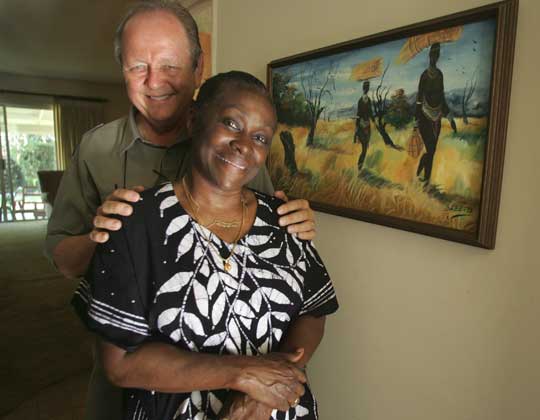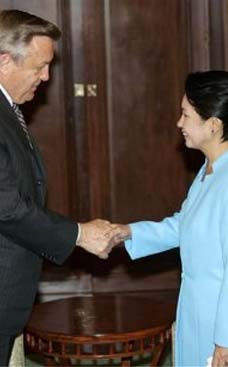
More than 5 million southern Sudanese were displaced by war. Up to 90 percent of the population cannot read or write. Ten miles of paved road exist in a region the size of Europe. And diseases eradicated elsewhere in Africa, such as sleeping sickness and guinea worm, flourish. "Both health and education are critical to the needs of the returnees," Reed said. They are also the "least controversial" types of aid that can be given to a country still recovering from political strife, he added. Reed directs this and other humanitarian efforts from a four-bedroom house he shares with other international-development agency staff members in Juba, the capital of southern Sudan. Since the program started in November 2005, about 100 doctors and educators have given up Western salaries and living conditions to return to Sudan for three months of service. In Sudan, the reception has not always been rapturous. "Sometimes there are attitudes (like), 'Who are these people coming back who were living these cushy lives while we were suffering?' " Reed said. "But the Sudanese government has clearly recognized the importance of (returnees) and the skills they bring." Reed said the proof of this is in the outcome: Almost 50 percent of the volunteers have since returned to Sudan, and several have stayed permanently. One volunteer, a doctor from Tennessee, is now the deputy director of southern Sudan's National HIV/AIDS Council. A Texas professor has become a minister in Sudan's fledgling government of national unity.
Ethiopia RPCV Allan Reed created a Diaspora Skills Transfer Program to bring educated southern Sudanese living abroad back to the country that needs them
Rerouting talent
A man rounds up efforts to return skilled Sudanese expatriates to their homeland.
By GWENDOLYN DRISCOLL
The Orange County Register
Caption: ACK TO SUDAN: Allan Reed and wife Ayo Reed pose next to Sudanese art which represents Dinka tribal life. They met when she was working as a nurse in Sudan in 1972 and were married in 1974 and are preparing to return.
He was an African soldier with the same uniform, scruffy pointed beard and jet-black skin of many others of his Sudanese Dinka tribe. Yet somehow he stood out.
"He was so charismatic," Allan Reed said. "It was obvious he was highly intelligent."
The soldier to whom he referred was a man named John Garang. It was 1970, and Reed, a graduate of La Habra High School and UC Berkeley, was a young American development worker in the Sudan known for his shock of white-blond hair and penchant for thousand-mile treks across the region's sweltering landscape.
The stocky soldier he met in Sudan impressed him. Garang was a rarity – an educated southern Sudanese who had turned down a scholarship at an American university to help fight for his country.
Reed had no idea that the "raw recruit" he had just met would become not just the leader of one of the longest – and most brutal – liberation struggles in modern history. He would also become Reed's lifelong friend.
"He was the Nelson Mandela of Sudan," Reed says of Garang. "He was able to articulate this vision for Sudan that resonated everywhere, not just the south."
Not everyone agrees with Reed's glowing opinion of Garang, a southern Sudanese general who waged a 21-year battle against the government of northern Sudan.
In a 2005 statement, Amnesty International said both sides of the conflict were responsible for "countless human rights violations," and, "The laws regulating internal armed conflicts have been massively and systematically breached."
Yet Garang's vision also helped bond Reed, now 63, to the equatorial country in which he lives today.
Reed is the director of the United States Agency for International Development's humanitarian program in southern Sudan, a swath of East Africa roughly the size of Europe that is characterized by its dramatic landscapes, statuesque tribesmen and a less palatable trait: war.
For much of the past half-century, largely Christian and animist tribes in the south have fought the Muslim and Arab North for political and religious autonomy.
The result was a January 2005 peace agreement between the government in Khartoum and the rebel Sudan People's Liberation Movement in the South.
John Garang, then the movement's top commander, signed on behalf of the South. Three weeks later he died in a helicopter crash.
His death dealt a blow to an already fragile peace process. It also moved Reed to create a program that brings educated Sudanese from outside the country back home, where their skills and expertise are sorely needed.
His model in part was Garang.
"That's so typical of what I admire about the south Sudanese," Reed said. "They are people who could work anywhere in the world but choose to stay."
Garang was the ultimate example of that, and Reed may be as well. He had planned to stay in Africa only two years when he joined the Peace Corps in 1966. He would live there on and off for more than two decades.
He became hooked on Sudan as an English teacher on the Sudanese border. There, he listened to persecution stories from refugees fleeing Sudan's civil war that made him reconsider plans of law school back home.
Instead, he took a High 8 camera on a 3,000-mile trek into the bush. For weeks he dodged bullets, ate wheel-shaped slabs of elephant trunk to stay alive, nearly collapsed of what he thought might be cholera and documented the starvation and displacement of Sudan's people.
The resulting footage aired on NBC and launched Reed on a career as a Sudan expert. He became an aid worker, working around the world on humanitarian programs but always returning to the country that captured him most: Sudan.
There he would run into Garang, who had become the movement's commander and forged a reputation for brutal tactics. He also was the only southern Sudanese leader with the credibility and the vision to unite the country, Reed said.
"John said that the problem was not between North and South, Muslim and Christian. The problem was a clique of people that controlled all power. And the solution was democracy," Reed said. "It impressed me, and it impressed people in the North."
Throughout the more than 20 years of war, Reed and Garang would meet many times. Garang and his wife, Rebecca, spent Thanksgiving with Reed in Washington, D.C. When Garang died, Reed spoke at his funeral.
"The tragedy with the loss of Dr. John is that there isn't anyone of his stature to replace him," Reed said. "That's a challenge for Sudan."
Faced with that challenge, Reed created a Diaspora Skills Transfer Program to bring educated southern Sudanese living abroad back to the country that needs them.
More than 5 million southern Sudanese were displaced by war. Up to 90 percent of the population cannot read or write. Ten miles of paved road exist in a region the size of Europe. And diseases eradicated elsewhere in Africa, such as sleeping sickness and guinea worm, flourish.
"Both health and education are critical to the needs of the returnees," Reed said. They are also the "least controversial" types of aid that can be given to a country still recovering from political strife, he added.
Reed directs this and other humanitarian efforts from a four-bedroom house he shares with other international-development agency staff members in Juba, the capital of southern Sudan.
Since the program started in November 2005, about 100 doctors and educators have given up Western salaries and living conditions to return to Sudan for three months of service.
In Sudan, the reception has not always been rapturous.
"Sometimes there are attitudes (like), 'Who are these people coming back who were living these cushy lives while we were suffering?' " Reed said. "But the Sudanese government has clearly recognized the importance of (returnees) and the skills they bring."
Reed said the proof of this is in the outcome: Almost 50 percent of the volunteers have since returned to Sudan, and several have stayed permanently. One volunteer, a doctor from Tennessee, is now the deputy director of southern Sudan's National HIV/AIDS Council. A Texas professor has become a minister in Sudan's fledgling government of national unity.
For his part, Reed would like to see the Sudanese government create an organization like the Peace Corps that would allow hundreds – potentially thousands – of Sudanese expatriates to return to their traumatized country.
"They are an extraordinary group of people," Reed said. "They bring a creative spark of change."
Contact the writer: 714-704-3704 or gdriscoll@ocregister.com




















